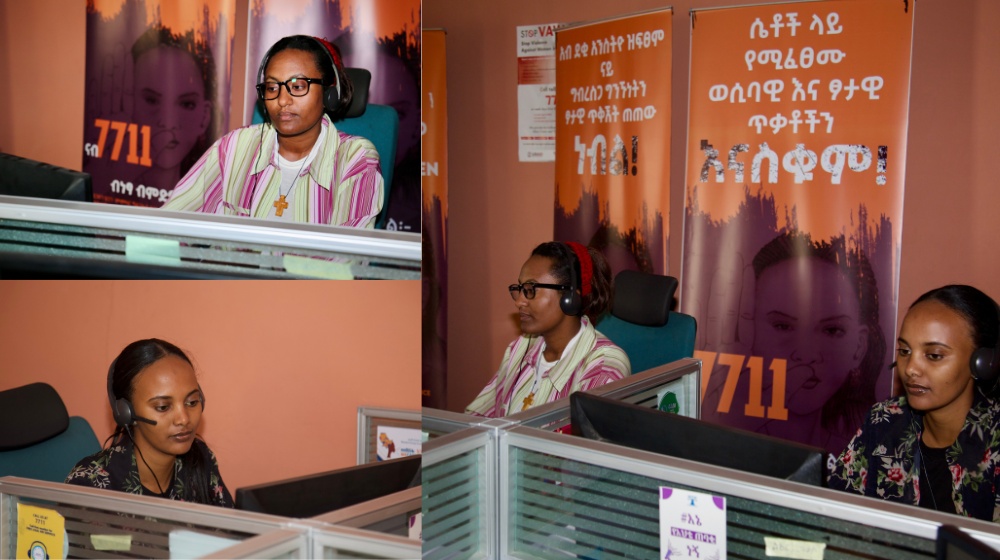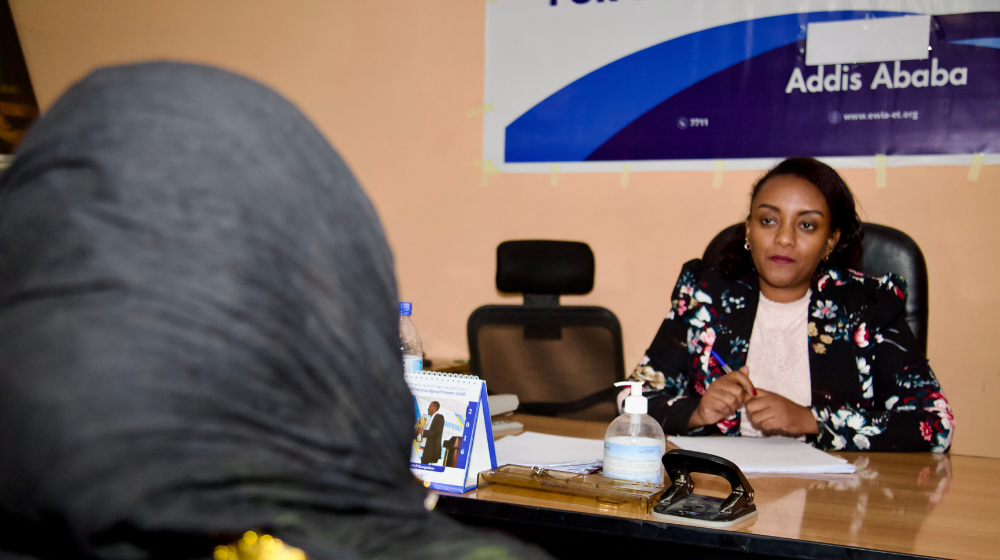Tinsae*, a 20-year-old from Addis Ababa, was living a quiet life until two traumatic incidents upended her world. Alone at night while her parents were away, a stranger broke into her house and assaulted her. She was raped twice in the span of a few years. Since then, Tinsae has lived in fear, unable to go out without reliving the trauma.
“I am scared to go out,” Tinsae says, her voice trembling. "The fear never leaves me, even when I am at home. My life has stopped".
Tinsae's story is not an isolated one. Across Ethiopia, gender-based violence (GBV) continues to have a heavy toll on women and girls, leaving them not only physically scarred but socially marginalized. Survivors face immense challenges—emotional trauma, community stigma, and a legal system that often fails to fully protect them. But in the fight for justice, hope is not lost, thanks to the Ethiopian Women Lawyers Association (EWLA), an organization that provides a lifeline for women seeking to uphold their rights.
EWLA: Nearly Three Decades of Advocacy and Legal Aid for Women
For almost 30 years, EWLA has stood at the forefront of defending women's rights in Ethiopia. Since then, the organization has supported over 137,000 survivors of GBV, offering them free legal aid services and working tirelessly to ensure justice is served. “We are here to help survivors, to provide them with a voice, and to ensure they are not abandoned by the legal system,” says Senait Tassew, a dedicated lawyer and volunteer at EWLA.
Founded by a group of lawyers in 1991, EWLA provides free legal assistance to women who cannot afford legal services. This support spans eight regions in Ethiopia, where EWLA’s team of lawyers and volunteers work to bridge the gap between vulnerable women and access to justice. From family-based GBV cases to complex legal reforms, EWLA works relentlessly to protect the rights of women and push for stronger legal frameworks that ensure their protection.
One of the most pressing legal challenges in Ethiopia is the intersection between legal issues and economic, social, and psychological barriers faced by survivors. As Senait explains, “GBV is not just a legal issue; it's an economic and psychological one too. Women face isolation, financial dependency, and social stigma, all of which make it harder to access justice.” In one such case, EWLA fought for a woman who had been evicted from her home by her husband, leaving her and her children with nowhere to go. EWLA secured the woman's right to stay in the house, marking a rare victory in a society where the law often fails to favor them.
A Holistic Approach: Legal Aid, Support, and Advocacy
EWLA’s approach is holistic, understanding that the legal challenges faced by survivors are often closely linked to economic hardship and social exclusion. Through mobile clinics in underserved areas and a network of grassroots committees, the organization brings legal aid directly to survivors. These mobile clinics offer immediate legal assistance, especially in conflict zones where access to justice is limited. They also collaborate with local authorities and work within communities to challenge harmful social beliefs surrounding GBV.
In her advocacy work, Senait often faces the challenge of a legal system that is not fully equipped to handle the complexities of GBV. "The law is scattered across different codes, and there is no single, comprehensive law on GBV," she says. “We need a law that recognizes the unique nature of GBV, one that specifically addresses issues like evidence collection and survivor protection.” EWLA continues to advocate for legal reforms, pushing for a dedicated GBV law that will bring better protection for survivors.
"It's not enough to just provide legal aid," Senait stresses. "The community must be educated about women’s rights and GBV. We need to change the community’s attitudes and bring them into the fight for gender equality. Women deserve to live free from violence, and we must ensure the law supports and protects them."

UNFPA’s Lifeline: Strengthening Legal Aid and Advocacy Efforts
Since 2020, UNFPA has been supporting EWLA to expand its impact by providing immediate legal aid services through a toll-free hotline. This hotline offers free legal aid and counseling to survivors in three regional languages, ensuring women across Ethiopia can access critical legal support when they need it most.
“The hotline has been crucial in bridging the gap for survivors who may be afraid or unable to visit a lawyer in person,” says Senait. "Also, UNFPA’s support has given us the tools to strengthen our advocacy efforts for advancing legal procedures that protect the rights of women and girls."
Beyond the hotline, UNFPA has helped EWLA provide transportation for survivors, covering costs for them to attend legal proceedings or visit health facilities. This support ensures that survivors can navigate the legal system without facing additional financial strain, enabling them to seek justice and healing.
Building a Future Free from Gender-Based Violence
Despite all the progress made, there is still much work to be done. The journey to justice for survivors is fraught with challenges, from legal gaps to societal stigma. As Senait puts it, “It’s not just about providing legal aid—it’s about changing the mindset of society. Women must be seen as equals, and GBV must be recognized as a crime that deserves full legal action.”
As part of the 16 Days of Activism against Gender-Based Violence, EWLA is calling for greater support, not just in legal aid, but in a comprehensive shift towards women’s empowerment and a society free from violence. "To those who are experiencing violence, you are not alone," Senait urges. “We are here for you, and we will always be, no matter what.”
Tinsae’s story, along with the stories of countless other survivors, underscores the urgency of continued advocacy, legal reform, and the need for a society that values and protects its women. "I want to live without fear," Tinsae says, holding on to the hope that with continued support, one day she will feel safe again.
*Name changed for protection and safety reasons.


